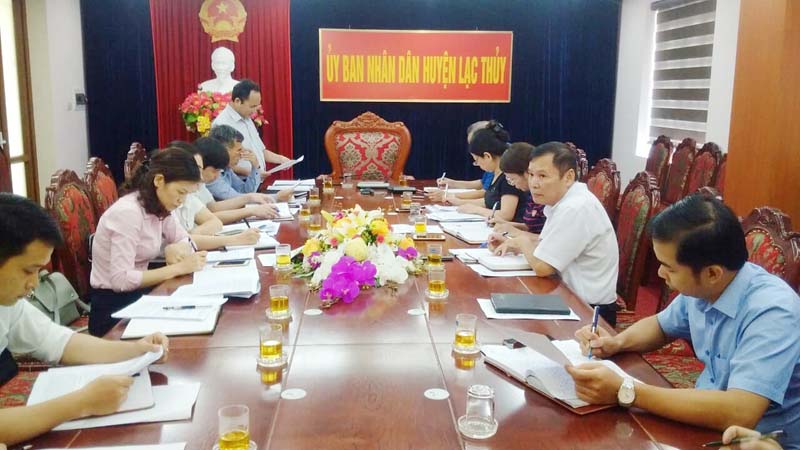
(HBO) - Representatives of the Steering Committee for Collective Economic Development of Hoa Binh province had a working session with the People's Committee of Lac Thuy district on collective economic development in the district.
 Representatives of
the provincial Steering Committee for Collective Economic Development on their
working trip to Lac Thuy district.
Representatives of
the provincial Steering Committee for Collective Economic Development on their
working trip to Lac Thuy district.
Lac Thuy district is home to 27 cooperative groups, 26 of
them are general business cooperative
groups, and one specialising in manipulating ornamental stone.
The district has 38 cooperatives operating under the 2012 Cooperative Law,
including 32 agricultural service cooperatives, three handicraft cooperatives, two
transport service cooperatives, and one trade and service cooperative.
The total number of members and employees of the
cooperatives is about 1,167. The per capita income in handicraft and trade cooperatives
is about 5 - 7 million VND per month; in agricultural service cooperatives
ranging from 1.8-2 million VND per month.
The total revenue of cooperative groups is estimated at 675 million VND, the average
revenue of each cooperative group is 25 million VND, while the average profit
of each cooperative group reaches 12.5 million VND.
Meanwhile, the total revenue of the cooperatives reaches 14.5 billion VND, the average
revenue of each cooperative is estimated at 381.5 million VND and the average
profit of each cooperative is 58.2 million VND.
In 2019, Lac Thuy has built
priority programmes, projects and plans on developing agricultural cooperatives which applying high technologies in producing
and consuming farm produce. The certification of Lac Thuy chicken brand will be
announced.
Attention
has been paid to deploying production value chain of chili and Paro onion;
mobilizing and calling big firms to join cooperatives to organise agricultural
production in value chains.
The
district’s authorities have also worked to provide information; consultation on
building regulations, production and business plans, and training courses on legal regulations and implementing contents
related to converting cooperatives and establishing new cooperatives in line
with the 2012 Cooperative Law; training for cooperative managers, professional
staff working on the collective economic sector./.
Hoa Binh province is undergoing a dynamic transformation amid Vietnam’s national digital transition. Building on Poliburo’s Resolution No. 57-NQ/TW on breakthroughs in science, technology, innovation, and national digital transformation, the province has rolled out a wide range of practical action plans. A standout initiative is the "Digital Literacy for All” movement, an effort to ensure that no one is left behind in the digital era.
Hoa Binh province is undergoing a dynamic transformation in the wake of the national digital transformation movement. Building on Resolution No. 57-NQ/TW of the Politburo on breakthroughs in science, technology, innovation, and national digital transformation, the province has implemented a wide range of practical action plans. A standout initiative is the "Digital Literacy for All” movement ambitious effort to ensure that no one is left behind in the digital age.
With a spirit of unity and proactive problem-solving, the Party Committee, the government and the people of Dong Lai Commune (Tan Lac District) have made great strides in implementing the resolutions of the 24th Party Congress of the commune for the 2020 - 2025 term. Focusing on leadership and practical actions, the commune has brought the Party’s resolutions into daily life, creating strong impacts and pushing the local development forward.
Amid the nationwide push for digital transformation, young people in Hoa Binh Province are stepping up as dynamic pioneers, applying technology to enhance Youth Union operations and expand the reach of youth-led initiatives. Through creativity and adaptability, Youth Union organizations at all levels have introduced a series of practical solutions, contributing to modern governance and community development.
In recent years, An Nghia commune, located in Lac Son district, has stepped up administrative reform, focusing on improving the quality and efficiency of its single-window service unit for receiving and processing administrative procedures. These improvements have helped create favourable conditions for local residents and organisations to handle administrative procedures, contributing to the commune’s broader socio-economic development.
The Prime Minister-approved master plan to develop the multi-use value of forests ecosystems through 2030, with a vision to 2050, aims to improve the management and sustainable use of forest resources, create jobs, increase incomes, and improve the living standards of ethnic minorities, people in mountainous and remote areas, forest workers and those living near forests.



 Representatives of
the provincial Steering Committee for Collective Economic Development on their
working trip to Lac Thuy district.
Representatives of
the provincial Steering Committee for Collective Economic Development on their
working trip to Lac Thuy district.